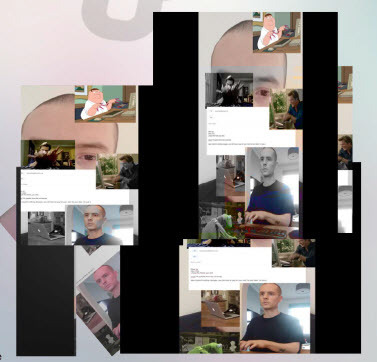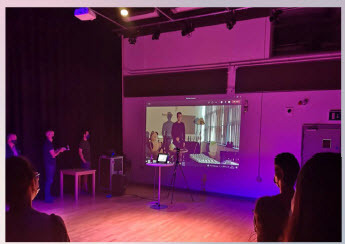My Practice as Research across the COVID-19 pandemic focused on the relations between smart assistants, wellbeing apps, algorithms and habits through my projects You Are Not Done Yet (2020) and Are You Done? (2021). My works were performative responses to solitude that explored the frictions between humans and non-humans and highlighted solitude as a mental health issue. Here I present my work paired with an understanding of habits as actions and 'rituals' inhabiting the hyperconnected intersection of public and private during the COVID-19 pandemic, decomposing the individual into a social body (see also Raunig 2016). In my practice, habits are explored both as authoritative forms of control and, in opposition, as revolutionary forces to the techno capitalist systems that enforce them (Bridle 2018; Noble 2019).
Since the introduction of the smartphone, our social and private lives are increasingly mediated by algorithms as habit trackers, even more so in the pandemic and post-pandemic world. During the outbreak of COVID-19, I ended up alone in my flat, isolated, with no human contacts other than those mediated by social networks and apps. I spent the entirety of my first lockdown in complete solitude, becoming one with the digital technologies around me. Numerous mental health centres provided online counselling, as much as private companies developed automated, artificial intelligence (AI) based mental health apps such as Mindstrong and Headspace. Other kinds of self-care and self-management apps raised and doubled the amounts of downloads: home workouts, sleep monitoring and recording, dieting and meal planners became valuable tools to track habits and the spread of the virus. I downloaded them all. I became a hyperconnected human, with a clear schedule decided by a 'wellbeing plan' constructed by different apps, which would suggest a 'habit' that was good for me. I woke up at 7 a.m., did yoga, cooked breakfast and so on, in a constant repetition, which eventually led me to algorithmic alienation. I became my habits.
From this experience of hyperconnected solitude, I devised two directly related performative responses. Created in different formats (video, online participatory performance and mixed performance), the works deal with my relationship with smart assistants, social media algorithms and apps set to 'enhance' productivity, promote wellbeing habits and track my schedule. You Are Not Done Yet (YANDY) is an autobiographical piece funded by The Box in Plymouth. YANDY is a monologue for artificial voice and solo performer. Drawing mainly from real-life moments I experienced for months, the monologue comprises lines taken from mental health apps, YouTube, Amazon offers, adverts and other social media outputs I have seen during the lockdown. YANDY is practice as life, metaphor and experience simultaneously. Allegory and reality. Theatre of everyday life. I could say that some of the inputs that the synthetic voice gives to the human are made up, but I would not be accurate. To write the piece, I collected titles, 'challenges', trends and actual products shown on my feed, and scripted within a faithful representation of my habitual schedule.
My days in lockdown passed with algorithms as companions; they were getting to know me increasingly well. Even if YANDY might be read as a dystopian technological drift, it is simply a metaphorical - yet not so much - enaction of my experience: the border between life and fiction, virtual and reality, is thin.
Are You Done? (2021) was a direct evolution of YANDY in the form of immersive performance. Through my work, I imagined a deeper relationship with the obscure technologies behind voice assistants by giving the audience a chance to programme the commands. Are You Done? consisted of different tasks, including a pre-show questionnaire and a performative live interview with a synthetic voice, to explore the idea of ethical digital companionship and solitude in the lockdown era. My everyday life habits, which were originally decided and constructed by machines, are recreated by the audience members, who can freely make the performer (me) do what they want. I was lying in a room with random objects around me. A live feed of the room was projected via Microsoft Teams to the audience. From home or onsite, the participants could type into a chat an action for me to perform. An artificial voice would then read the action to me, and I would find the best way to enact it. Every prompt was an improvised suggestion by the audience, who did not have a script, but only a series of guidelines.
First, by giving the 'words' to the audience, the participants are repositioned as 'deus-ex-machina' as they experience the actual functioning of any automated/data-based app as a series of randomized sentences without the obvious ordinary cohesive sense. Second!, Are You Done? Was an exercise in empathic collaboration: would the audience make me do silly, dangerous and increasingly useless actions, or would they prioritize my wellbeing, collectively and silently agreeing upon what was best for me? Would they respond positively to my physical prompt ('I am hungry', 'I need to go to the toilet') by acting based on my requests?
Inspired by the work of other artists and creative technologists such as MELT (2022), I wonder if habits can be implemented as rituals for wellbeing or if they simply risk the increased machinization of humans. If, for YANDY, the algorithmic reproduction of habits moved from liberating to oppressive, for Are You Done? the collaborative nature of the experience allowed the creation of newly devised imaginary habits as resisting forces to the 'algorithmic authority'. Arguably, as habits are always externally cued, these new algorithmically scripted forms of auto-control are the frontier spaces for society to debate the appropriate level and nature of the techno-capitalist authorization of our lives.
References
- Bridle, James (2018) New Dark Age: Technology and the end of the future, London: Verso.
- MELT (Britton, Ren Loren & Paehr, lz) (2022) Rituals against Barriers, meltionary.com/meltries/a.html, accessed 26/02/2024
- Noble, Safiya Umoya (2018) Algorithms of Oppression: How search engines reinforce racism. New York, NY: New York University Press.
- Raunig, Gerald (2016) Dividuum: Machinic capitalism and molecular revolution, Boston, MA: The MIT Press.



